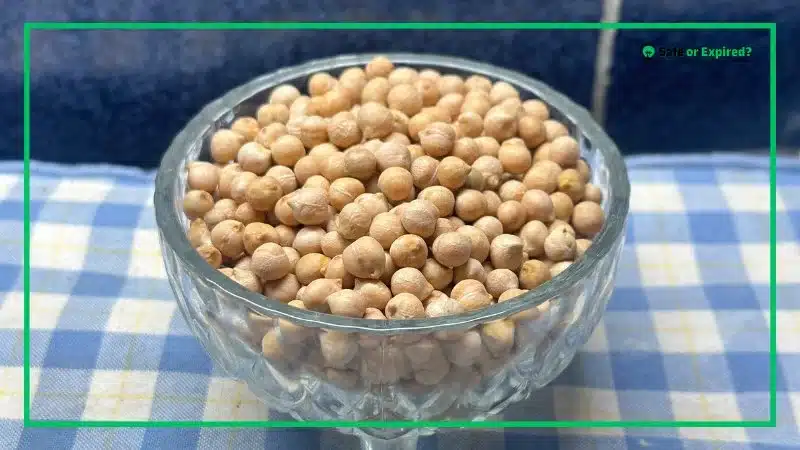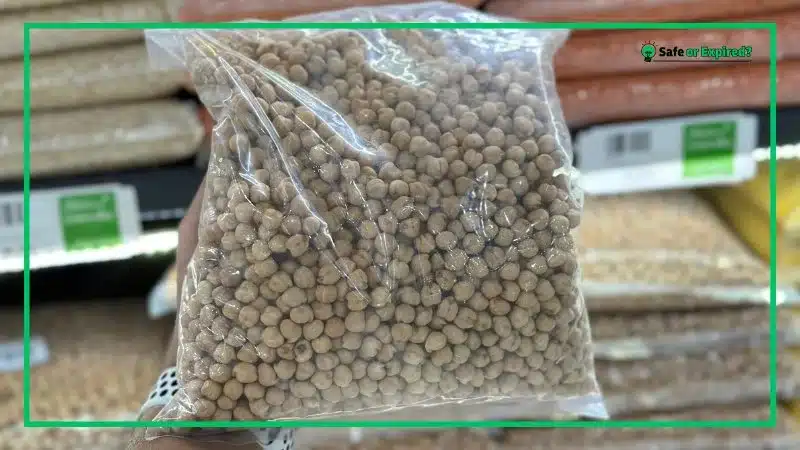“How long do chickpeas last?” is a practical question for anyone stocking up their pantry. Well, chickpeas can stay good for up to a couple of years (depending on storage). Whether you’re stashing them in the pantry, fridge, or freezer, knowing their shelf life can be a game-changer for meal planning.
Stick till the end to uncover all about how long chickpeas last, along with some top tips that will help you reduce waste.
How Long Do Chickpeas Last? Shelf Life
Chickpeas can last for quite a while. Dried chickpeas have an impressive shelf life, often remaining good for up to two years if kept in a dry place. Once you open a can of chickpeas, the leftovers can be refrigerated and are best used within 3-4 days.
Here’s a concise table that outlines the shelf life of chickpeas in various storage situations:
| Chickpea Type | Storage Condition | Shelf Life |
| Dried Chickpeas | Cool, dry place | Up to 2 years |
| Cooked Chickpeas | Refrigerator | 3-5 days |
| Cooked Chickpeas | Freezer | Up to 12 months |
| Opened Canned Chickpeas | Refrigerator | 3-4 days |
| Unopened Canned Chickpeas | Cool, dry place | 2-3 years (can extend beyond) |
| Soaked Chickpeas | Refrigerator (in water, changed daily) | 3 days |
| Roasted Chickpeas | Refrigerator | Up to 1 week |
How Long Do Chickpeas Last Out of the Can?
Once removed from the can, chickpeas can last for about four days in the refrigerator if stored correctly. To extend their shelf life, keep the chickpeas submerged in water and store them in a tightly sealed container. This method helps preserve their texture and flavor, making them ready for your next meal prep or recipe.
How Long Do Chickpeas Last Once Opened?
After opening, canned chickpeas remain fresh for 3 to 4 days when properly stored. To keep them in the best condition, transfer the chickpeas to an airtight container and cover them with water. This ensures they retain their moisture and are ready to be added to salads, soups, or other dishes.

How Long Do Chickpeas Last in the Fridge?
Cooked chickpeas can last for about five days in the fridge. You should place them in an airtight container to ensure they maintain their texture. This makes them a convenient option. You can simply open the container and start preparing the meal.
People often ask, How Long Do Uncooked Chickpeas Last in the Fridge? Uncooked chickpeas, if kept dry, do not need refrigeration and can last up to two years in a cool, dry pantry. However, if you choose to refrigerate them, ensure they are in an airtight container.
Another query to discuss here is, “How Long Do Cooked Chickpeas Last in the Fridge?” Cooked chickpeas stored in the refrigerator can remain fresh for 3 to 5 days. Keep them in an airtight container, and make sure they are covered with water. This method helps in keeping them moist and ready for use in various recipes.
Ever wondered, “How Long Do Canned Chickpeas Last in the Fridge?” Once opened, canned chickpeas last for 3 to 4 days in the refrigerator. You may now be wondering, “How Long Do Roasted Chickpeas Last in the Fridge?” Roasted chickpeas can be stored in the fridge for up to a week when kept in an airtight container. This helps to maintain their crunch and flavor.
How Long Do Chickpeas Last in the Freezer?
Cooked chickpeas can last in the freezer for up to 12 months when properly stored. To ensure the best quality, freeze them in airtight containers or heavy-duty freezer bags. Make sure to cool the chickpeas completely before freezing to maintain their texture and flavor.
This method is ideal for extending their shelf life while keeping them ready for use in various dishes.
How Long Do Chickpeas Last in Water?
Chickpeas stored in water can last in the refrigerator for about 3 to 4 days. It’s important to use a clean, airtight container and change the water daily to ensure the best quality and to prevent it from going bad.
How Long Do Soaked Chickpeas Last in the Fridge?
Soaked chickpeas, when refrigerated, can last for up to 3 days if they are kept in water and the water is changed daily. Keeping them chilled slows down the fermentation process that begins once they’re soaked, preserving their freshness and usability for cooking.
People also ask many other queries about chickpeas’ shelf life. Let’s discuss them as well.
How Long Do Dried Chickpeas Last?
Dried chickpeas can last up to two years when stored in a cool, dry place. Keeping them in an airtight container/bag helps to protect them from spoilage factors, like moisture and pests. This long shelf life makes dried chickpeas a pantry staple, ready to be used in a variety of dishes whenever needed.

Also, knowing how to handle food safely is crucial. Check out the guidelines from experts in “Essential Food Safety Practices.”
How Long Do Canned Chickpeas Last?
Unopened canned chickpeas typically have a shelf life of 2 to 3 years and can often be safely used beyond that, provided the can remain intact and stored in a cool, dry place. Once opened, they should be transferred to a different container if not used immediately and consumed within 3 to 4 days.
How Long Do Canned Chickpeas Last After Expiration Date?
Canned chickpeas can often be safe to consume up to one year past their expiration date if the can show no signs of damage such as bulging, rusting, or severe denting. Always check for signs of spoilage after opening and consume promptly once opened.
How to Know Chickpeas Have Gone Bad?
To determine if chickpeas have gone bad, check for changes in texture, smell, and appearance. Spoiled chickpeas may have a sour smell, slimy texture, or visible mold. Discard any chickpeas that have these signs to avoid consuming spoiled food.
Change in Texture
When chickpeas spoil, their texture changes significantly. Fresh chickpeas, whether cooked or canned, should be firm but tender. If you find that the chickpeas have become excessively soft, mushy, or even slimy, it’s a clear indication they are no longer good to eat.
This texture change happens due to bacterial growth or the breakdown of the chickpea’s natural structure, which accelerates when stored improperly or kept for too long after their best-by date.
Unusual Smell
Fresh chickpeas have a mild, nutty smell. If your chickpeas start to emit a sour or foul odor, it’s a warning sign they may have gone bad. Spoiled foods develop unpleasant smells due to mold and bacteria, which can produce gasses and other byproducts as they decompose the food.
Trust your nose — if chickpeas smell off, it’s safer to throw them away rather than risk eating them.
Visible Mold
One of the most obvious signs that chickpeas have gone bad is the mold. Mold can appear in various colors. The common ones are white, green, or black, and it may look fuzzy or slimy. Eating moldy chickpeas can be harmful to your health, leading to food poisoning symptoms like nausea, vomiting, and diarrhea.
Always inspect chickpeas before cooking or eating them, and if you spot any mold, discard them immediately to avoid health risks.
By recognizing these signs, you can ensure that you consume chickpeas when they are of the best quality and avoid the risks associated with spoiled food.
Can Spoiled Chickpeas Make You Sick?
Yes, consuming spoiled chickpeas can make you sick. Spoiled chickpeas can harbor bacteria, molds, or toxins that may lead to food poisoning. Symptoms of food poisoning from eating spoiled chickpeas can include stomach cramps, nausea, vomiting, diarrhea, and fever.
These symptoms can occur a few hours to several days after consuming the contaminated food. To avoid illness, it’s important to ensure that chickpeas are stored properly and consumed before they show signs of spoilage. Always inspect chickpeas for unusual smells, textures, or visible mold before eating them.
Heard some old tips about storing food? Not all are true. Learn what really works in “Breaking Down Food Preservation Myths.”
What to Do With Spoiled Chickpeas?
If chickpeas are spoiled, they should not be consumed. Dispose of them properly to avoid health risks. Composting is a responsible way to handle spoiled chickpeas, turning them into useful soil fertilizer instead of just throwing them away.
Dispose of Them Safely
When chickpeas go bad, it’s important to dispose of them in a way that avoids spreading bacteria or attracting pests. Seal them in a plastic bag, and then place them in your trash bin.
This method ensures that spoiled chickpeas are contained, reducing the risk of contaminating other foods or attracting animals and insects to your garbage.
Consider Composting
Composting spoiled chickpeas is an environmentally friendly option. Chickpeas, like other organic materials, can break down naturally in a compost bin or pile. By composting them, you turn waste into a resource that can enrich the soil in your garden.
Make sure to bury the chickpeas deep within your compost to prevent attracting animals. This process helps return nutrients to the earth, promoting healthier plant growth without wasting food completely.
Do Not Recycle or Reuse
It might be tempting to think of creative ways to use spoiled chickpeas, but it’s important to prioritize health and safety. Do not attempt to recycle or repurpose spoiled chickpeas for consumption in any form, as they can pose serious health risks due to bacteria and toxins. Always opt for disposal or composting to handle spoiled chickpeas safely.
By following these tips, you ensure the safe handling of spoiled chickpeas, minimizing environmental impact and health risks associated with improper disposal.
Conclusion
As you can see, the shelf life of chickpeas varies depending on their state and storage conditions. Here’s a quick recap:
- Dried chickpeas can last up to two years if stored in a cool, dry place.
- Cooked chickpeas are good in the fridge for about 3-5 days and can last in the freezer for up to 12 months.
- Canned chickpeas have a long shelf life until opened, typically lasting 2-3 years unopened.
- Always ensure proper storage to maintain freshness and prevent spoilage.
By following these guidelines, you can ensure that your chickpeas remain a tasty and nutritious part of your diet for as long as possible!

